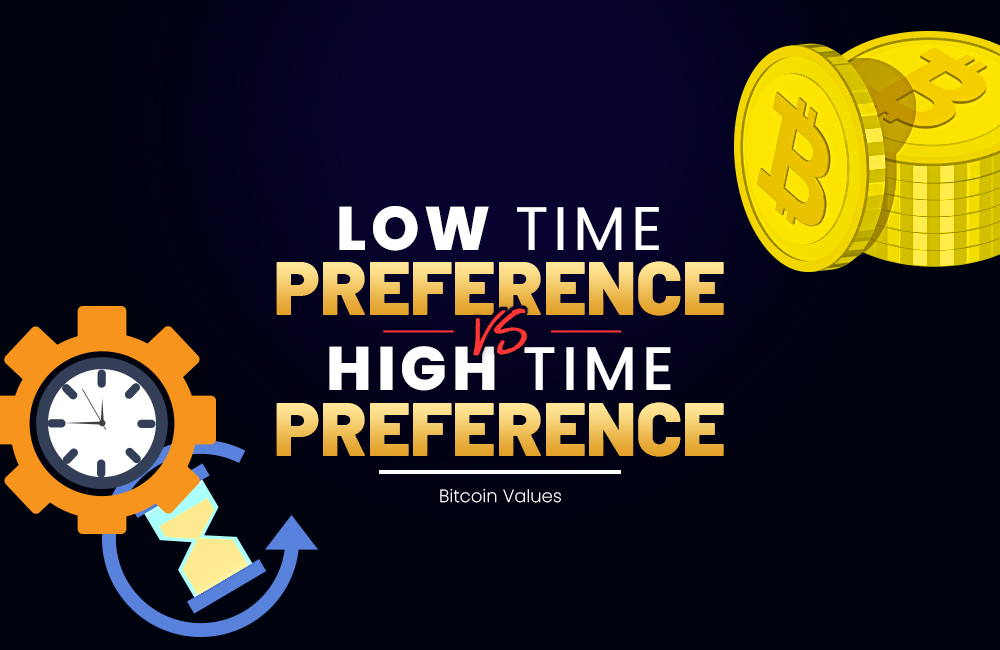
What we're talking about:
Low Time Preference vs High Time Preference Explained
While his traditional methods may seem less relevant in today’s hectic financial system, there is a lot to learn from Warren Buffet’s investment thesis. Most notably, he only became ridiculously rich late into his career, thanks to the compounding effect of his investments. Having a long-term mindset is incredibly beneficial, although with all the distractions presented to us in modern society, this is becoming increasingly difficult to achieve.
It’s not all about money though, as having respect for one’s future self can affect the individual and their peers in a variety of ways.
Delaying Gratification
Instant gratification, you’ve certainly heard of it. The phrase alone brings up negative connotations. Most likely, this is due to the fact that instant gratification very often leads to poor choices.
As members of modern society, we are constantly bombarded by distractions and requests for our attention, leading us to ignore our future plans and focus on the present. Social media app developers with their limitless scroll feeds jampacked with advertisements know this all too well.
The virtues of delaying gratification came to light following the 1972 Stanford marshmallow experiment. The experiment took note of children’s willingness to delay receiving an immediate reward in order to receive double the amount later on. Several years later, it appeared that the children who were more willing to delay their gratification achieved superior academic results and avoided a list of health issues such as weight loss or addiction.
Being able to delay our gratification is a highly useful skill. It starts by having a better understanding of our relationship between our present selves and the abstract notion of our future selves.
Measuring Time Preference
Quantifying this past-future relationship comes down to our preference for time. Someone with a high time preference is more inclined to act in a way that prioritizes their present wants and needs. Someone with a low time preference however will attempt to delay their immediate gratification in order to prioritize the achievement of future goals.
With some elementary thought, it’s easy to see how a lower time preference can be far more beneficial to one’s life, but external circumstances often cause us to direct our preference towards the here and now. Circumstances change from person to person, but basic needs such as food, shelter, clothing and education often require our immediate attention.
It is through incremental steps that one can begin to delay gratification. Replacing bad habits with more productive ones can go a long way to making a big change over time. This application extends much further than the wants and needs of the individual.
Advancing Society Takes Time
Time preference is often thought about in monetary terms but it goes much deeper than that. It is in fact a long series of delayed gratification efforts by our ancestors which led us to where we find ourselves today.
Taking the time to build tools, learning to plant seeds and waiting to harvest the fruits of their labor, instead of moving around to chase wild animals, ultimately led to humans developing more civil societies. Our ancestors learned to lower their time preference and were rewarded for their patience.
With more sensitivity to the benefits of lower time preference, humans eventually came up with the concept of money to efficiently capture and store any surplus value that resulted from their efforts. This value could be called upon at will and aided in the calculated creation of towns, cities and nation states.
Sound Money
The combination of value capture with a low time preference cannot be achieved without sound money. Were it not possible for people to store the fruits of their labor into a medium that retains value over time and space, we would eventually find ourselves back in the wild chasing our next meals.
Value should be stored in a manner that does not depreciate over time and sound money is the medium for this storage. It is why generational wealth gets transferred through families in the form of hard assets like gold and real estate. Britain’s two centuries of stable purchasing power under the gold standard are a prime example of this, as recounted by Saifedean Ammous in chapter 5 of his book The Bitcoin Standard.
Monetary systems that do not have sound characteristics are poor choices for passing value through space and time. This is why we see hurried, impatient behavior in countries where local fiat currencies have hyperinflated; their people’s ability to defer their time preference has effectively been removed.
It’s no surprise then that people around the world who are facing such struggles are turning to Bitcoin to capture their surplus value and protect their savings. Bitcoin lives up to its reputation of digital gold thanks to its robust properties: a finite supply, high divisibility and the ability to move seamlessly through space and time.
In Conclusion
When circumstances permit, deferring gratification and lowering your time preference usually leads to better outcomes. This approach goes hand in hand with taking the time to question your behavior, change your habits and learn new skills.
“Give a man a fish and you feed him for a day. Teach him how to fish and you feed him for a lifetime.”
What we're talking about:







